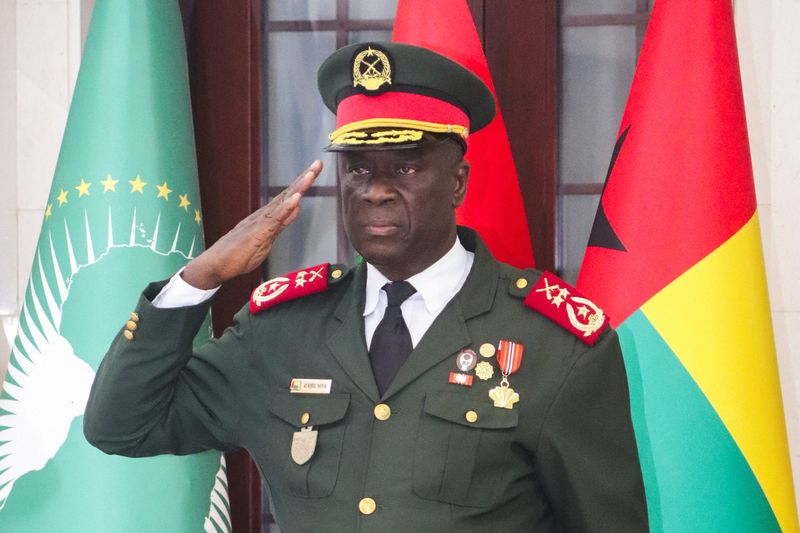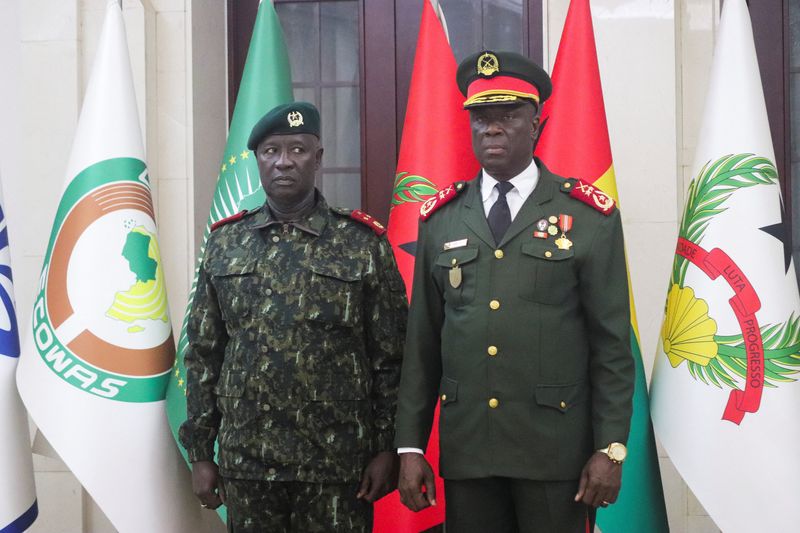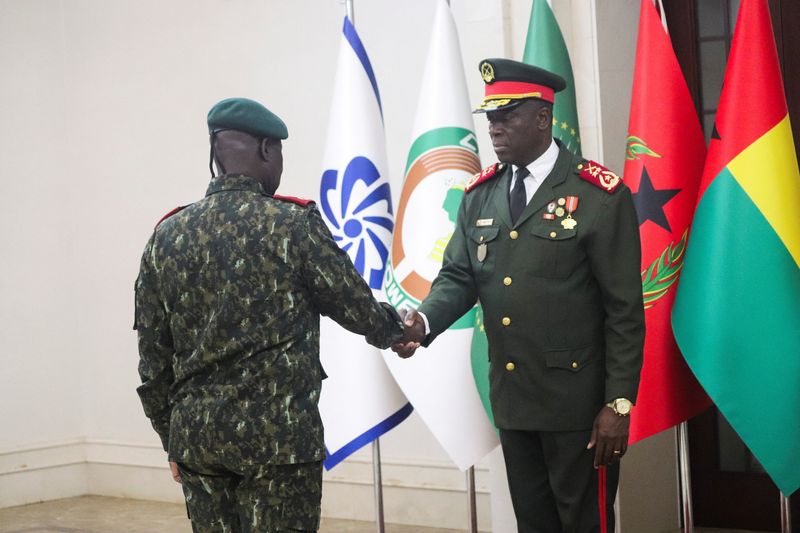BISSAU (Reuters) -Guinea-Bissau’s military installed Major-General Horta Inta-a as transitional president on Thursday, a day after soldiers toppled the civilian leadership in a swift power grab made before the results of a weekend election could be announced.
It was the ninth coup in West and Central Africa in five years and continued a pattern of instability in Guinea-Bissau, a notorious cocaine transport hub with a long history of military interventions in politics.

The self-styled “High Military Command for the Restoration of Order” announced in a televised statement on Wednesday that they had ousted President Umaro Sissoco Embalo. They said the move came in response to a destabilisation plan involving politicians and drug barons, without going into more detail.
Wearing a military uniform and flanked by other military officials, Inta-a made his first public appearance as leader at a ceremony broadcast Thursday on state television. He said the coup was necessary to stave off a plot by “narcotraffickers” to “capture Guinean democracy” and said the transition would last one year, beginning immediately.
At a swearing-in ceremony later on Thursday, he named Major-General Tomas Djassi as army chief of staff.
The takeover came a day before provisional results were due to be announced in the race between Embalo and Fernando Dias, a 47-year-old political newcomer who had emerged as Embalo’s top challenger in the presidential vote.
Before the coup announcement, gunfire rang out in the capital Bissau for about an hour on Wednesday near the electoral commission headquarters and presidential palace.
Embalo called French media to say he had been deposed.
An army statement dated Thursday said Embalo and other top officials were “under the control of the High Military Command”.
CONDEMNATION OF THE COUP
African Union chairperson Mahmoud Ali Youssouf condemned the coup in a statement, and called for the release of Embalo “and all detained officials.”
Heads of state from the West African regional bloc ECOWAS also condemned the coup and later held a virtual meeting to discuss the situation, according to a post on X.
Screen grabs shared with the post showed several regional leaders participating, including the presidents of Nigeria, Senegal and Liberia, as well as the AU’s Youssouf.
The European Union said constitutional order should be restored and the vote count allowed to proceed.
Central Bissau was mostly quiet on Thursday, with soldiers on the streets and many residents staying indoors, even after the overnight curfew lifted. Businesses and banks were closed.
“I’m very concerned about the prevailing situation,” Julio Goncalves, a 30-year-old professor and Bissau resident, said.
“No pharmacy is open. If somebody is sick how can he buy medicine or go to the hospital?”
‘FALSE COUP ATTEMPT’
Before Inta-a’s presidency was announced, Dias accused Embalo in a video statement of staging a “false coup attempt” to derail the election because he feared he would lose.
In a statement to Reuters on Thursday, the coalition backing Dias demanded that authorities be allowed to release results from Sunday’s presidential election.
The coalition also called for the release of former Prime Minister Domingos Simoes Pereira, who was detained on Wednesday, according to relatives and security sources.
Security forces used tear gas to break up a small protest outside the building where Pereira is said to be held. They also broke up a gathering near Dias’s home on the outskirts of Bissau and live rounds were fired, witnesses said.
There were no reports of casualties related to the violence on Wednesday or Thursday.
COUP-PRONE NARCOTICS HUB
Guinea-Bissau is a small coastal nation between Senegal and Guinea and a transit point for cocaine heading from South America to Europe. Under Embalo’s administration, the cocaine trade appeared to boom.
Another coup is unlikely to change that, said Lucia Bird Ruiz-Benitez de Lugo, director of the Observatory of Illicit Economies in West Africa, which tracks the cocaine trade.
“Major traffickers financed electoral campaigns in these elections. There is no sign the impact of cocaine on politics and governance in Bissau will decrease,” she said.
The country had been shaken by at least nine coups and attempted coups between 1974, when it gained independence from Portugal, and 2020, when Embalo took office.
ELECTION OBSERVERS UNACCOUNTED FOR
Election observers from the African Union and ECOWAS issued a joint statement on Wednesday calling for the immediate release of arrested election officials.
Nigerian former President Goodluck Jonathan, who had been observing the vote as part of the West African Elders Forum, was not reachable on Thursday and his whereabouts unknown, ECOWAS spokesperson Joel Ahofodji told Reuters.
Nigeria’s foreign ministry said the safety of election observers should be guaranteed. “We warn that those behind this act will be held accountable for their actions,” a statement said.
(Reporting by Alberto Dabo; Additional reporting by Robbie Corey-Boulet, Bate Felix and Ayen Deng Bior in Dakar, Alphonso Toweh in Monrovia and Camillus Eboh in Abuja; Writing by Ayen Deng Bior and Robbie Corey-Boulet; Editing by Ros Rusell and Andrew Heavens)




